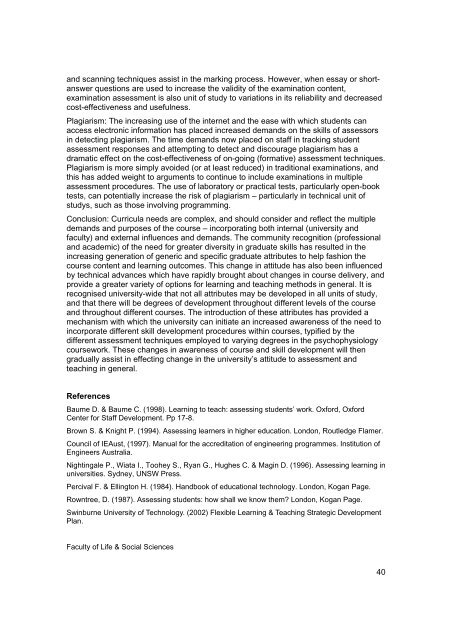Staff Information & Teaching Guide - Swinburne University of ...
Staff Information & Teaching Guide - Swinburne University of ...
Staff Information & Teaching Guide - Swinburne University of ...
Create successful ePaper yourself
Turn your PDF publications into a flip-book with our unique Google optimized e-Paper software.
and scanning techniques assist in the marking process. However, when essay or shortanswer<br />
questions are used to increase the validity <strong>of</strong> the examination content,<br />
examination assessment is also unit <strong>of</strong> study to variations in its reliability and decreased<br />
cost-effectiveness and usefulness.<br />
Plagiarism: The increasing use <strong>of</strong> the internet and the ease with which students can<br />
access electronic information has placed increased demands on the skills <strong>of</strong> assessors<br />
in detecting plagiarism. The time demands now placed on staff in tracking student<br />
assessment responses and attempting to detect and discourage plagiarism has a<br />
dramatic effect on the cost-effectiveness <strong>of</strong> on-going (formative) assessment techniques.<br />
Plagiarism is more simply avoided (or at least reduced) in traditional examinations, and<br />
this has added weight to arguments to continue to include examinations in multiple<br />
assessment procedures. The use <strong>of</strong> laboratory or practical tests, particularly open-book<br />
tests, can potentially increase the risk <strong>of</strong> plagiarism – particularly in technical unit <strong>of</strong><br />
studys, such as those involving programming.<br />
Conclusion: Curricula needs are complex, and should consider and reflect the multiple<br />
demands and purposes <strong>of</strong> the course – incorporating both internal (university and<br />
faculty) and external influences and demands. The community recognition (pr<strong>of</strong>essional<br />
and academic) <strong>of</strong> the need for greater diversity in graduate skills has resulted in the<br />
increasing generation <strong>of</strong> generic and specific graduate attributes to help fashion the<br />
course content and learning outcomes. This change in attitude has also been influenced<br />
by technical advances which have rapidly brought about changes in course delivery, and<br />
provide a greater variety <strong>of</strong> options for learning and teaching methods in general. It is<br />
recognised university-wide that not all attributes may be developed in all units <strong>of</strong> study,<br />
and that there will be degrees <strong>of</strong> development throughout different levels <strong>of</strong> the course<br />
and throughout different courses. The introduction <strong>of</strong> these attributes has provided a<br />
mechanism with which the university can initiate an increased awareness <strong>of</strong> the need to<br />
incorporate different skill development procedures within courses, typified by the<br />
different assessment techniques employed to varying degrees in the psychophysiology<br />
coursework. These changes in awareness <strong>of</strong> course and skill development will then<br />
gradually assist in effecting change in the university’s attitude to assessment and<br />
teaching in general.<br />
References<br />
Baume D. & Baume C. (1998). Learning to teach: assessing students’ work. Oxford, Oxford<br />
Center for <strong>Staff</strong> Development. Pp 17-8.<br />
Brown S. & Knight P. (1994). Assessing learners in higher education. London, Routledge Flamer.<br />
Council <strong>of</strong> IEAust, (1997). Manual for the accreditation <strong>of</strong> engineering programmes. Institution <strong>of</strong><br />
Engineers Australia.<br />
Nightingale P., Wiata I., Toohey S., Ryan G., Hughes C. & Magin D. (1996). Assessing learning in<br />
universities. Sydney, UNSW Press.<br />
Percival F. & Ellington H. (1984). Handbook <strong>of</strong> educational technology. London, Kogan Page.<br />
Rowntree, D. (1987). Assessing students: how shall we know them? London, Kogan Page.<br />
<strong>Swinburne</strong> <strong>University</strong> <strong>of</strong> Technology. (2002) Flexible Learning & <strong>Teaching</strong> Strategic Development<br />
Plan.<br />
Faculty <strong>of</strong> Life & Social Sciences<br />
40

















